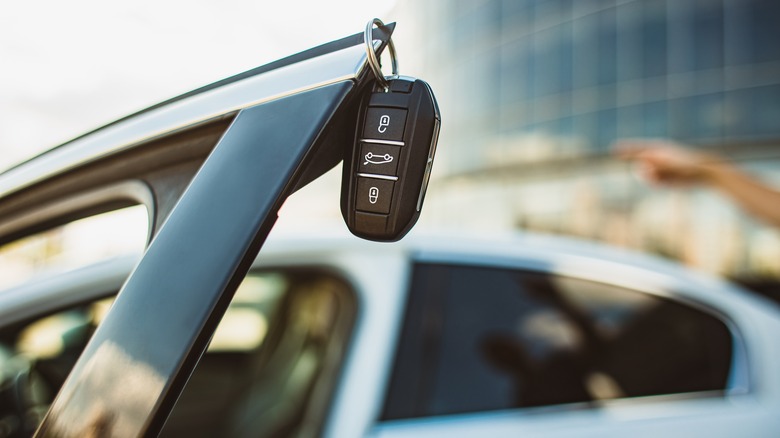11 Car Leasing Mistakes To Avoid At All Costs
A lease is an agreement between the consumer and a car dealership where, in exchange for a new car, the client agrees to a downpayment and regular monthly payments toward the potential vehicle ownership once the lease period is over. This usually includes additional fees for mileage and maintenance, with penalties attached to wear and tear on the vehicle that would necessitate further maintenance by the dealership, or racking up more mileage than the limit agreed to in your contract.Leased vehicles accounted for one-fifth of new vehicular purchases in 2023, with an average of nearly 5% interest on 60 months of vehicular financing being the likely motivator for consumers. Pickup trucks tend to be the vehicle of choice for leases, with 2.5 million trucks to one million cars being leased in 2021. Honda and Ford vehicles took the top spots.
Leasing a vehicle is a viable option if you require one for a short period or you either can't afford it or don't want to take on the expense of full ownership right now. However, there are a few things to consider before going down the leasing route that will save you a lot of money and headaches in the short and long term.
Leasing or buying when it doesn't make sense
The first big mistake to avoid is leasing a vehicle when you should just purchase one outright. There are reasons you may want to think twice before buying a new car. With the average non-luxury car running an average of $44,700 in July 2023, rapid depreciation of vehicular assets at a rate of 12% per year over the first five years, and sky-high loan interest rates of 7.51% from September 2023 — the equivalent of $801.71 for $40,000 worth of financing — it's entirely understandable why you may want to go for something lightly used for two or three years for up to 30% less.
If you aren't concerned with a long-term situation, and you want a lower downpayment, buying would be the wrong move. On the other hand, if you plan on doing more driving than less, buying might be preferable since the mileage you accumulate is nobody's business, and won't cost you additional money, unlike leasing, due to mileage limits attached to lease agreements. Where financing is concerned, payment periods beyond 60 months, while cheaper every month, will cost you more in interest payments in the longer term. Also, vehicles depreciate structurally and financially after the first five years. So if you want a vehicle at its best, while avoiding the cost of paying full value upfront, leasing is for you.
Not checking your credit before leasing
Do yourself a favor and know your credit rating before you start looking to lease a vehicle. As with any creditor financing, your dealership will want to know how safe a bet you are, which will affect your lease. According to Experian, although there's no minimum credit requirement on an auto lease, you may be required to put down a larger down payment or make bigger regular monthly payments if your credit is less than stellar. Paying more money upfront than you need may defeat the purpose of leasing your vehicle in the first place, so it's a very good idea to get your credit checked first if you don't already know your rating.
Hard checks done through your employer, credit card companies, or, very likely, a car dealership, can drop your score by as much as 10 points. However, a soft credit check run by your bank, credit union, or third-party apps and websites will show up on your report but will not affect your score. Once you know your credit score, you'll know ahead of time if you need to work on your credit before the dealership runs a hard check on you. If your credit score needs work, it's possible to build credit fast so you can lease your car without coming out of pocket more than necessary.
Not knowing your limit
As per the U.S. Department of Transportation, the average annual miles driven by US motorists from May 2022 was 13,476 miles, with men driving 16,550 miles and women clocking 10,142 miles on average. You'll want to keep this in mind since mileage limits in vehicle leases are common and can be costly if not adhered to. A high-mileage lease allows drivers a way to clock extra mileage without penalties, and although more expensive up front, one could save you hundreds of dollars on the backend. Something to remember is the amount of mileage you put on a car significantly affects its value, which would create a problem for you if you intended to pay off the lease and sell your vehicle after the fact.
A standard lease may suit you just fine. To calculate how much mileage you will put on the vehicle per year, multiply your estimated miles per week by 52 weeks or your estimated miles driven per month multiplied by 12 months. With most dealerships offering standard leases of up to 15,000 miles per year with penalties of up to 30 cents per additional mile — an extra $100 to $300 per 1,000 miles over the limit — if your calculation comes in below your limit then the economical choice is a standard lease. If not, opt for the high mileage lease agreement or consider just buying a car.
Being afraid to wheel and deal
While you are going to the dealership to ask for a lease, don't make the mistake of thinking there's no room for negotiation. When presented with your agreement, pay attention to the extras that you don't need but will end up paying for all the same. According to Consumer Reports, car dealerships' profit margins tend to be close to razor-thin, and the real money is made from financing. That being the case, it makes sense for them to upsell. Things like etching your vehicle identification number (VIN) into your windows for an extra $200 to $300 are unnecessary since there are already VINs stamped on new cars. Protective rust or paint coating will set you back $600 to $800 but, as long as you clean the car regularly, most modern vehicle exteriors are already built to last a decade or more.
Come prepped on typical lease terms your dealer will throw at you in between legalese. Knowing the meaning of terms like mileage allowance and Gross Capitalized Cost — both negotiable and related to your mileage limit per year and the perceived value of the vehicle at the start of your lease — will aid you in sounding assertive and knowing what you're talking about. Be sure to negotiate a reduced buyout price, which is the amount you'll pay the dealership for the car at the end of the lease period if you decide to purchase the vehicle.
Forgetting to shop around
As with any major purchase, you never want to buy the first thing you see. If you've done the first two things on our list, you should already have an idea of what your needs are in a vehicle, how much mileage you estimate you'll use, how long you intend to drive the vehicle, your budget, and whether you might want to purchase the vehicle at the end of your lease agreement. Having this knowledge should help you when it comes to shopping around for a lease. According to a survey conducted by Cox Automotive, 87% of dealers agree that online shopping solutions save customers time, and make for an all-around better experience for salespeople and car buyers, while 81% of people in the market for a new vehicle concur with dealers, which makes them pretty close in agreement.
Where shopping around is concerned, you should also research the vehicle you are interested in leasing, with price comparisons backed up by experts in automotive pricing like Kelley Blue Book or Edmunds Car Buying Guide. Knowing your credit rating puts you in a better position to shop around for a pre-approved car loan rate before you even approach the dealership. This is another advantage you'll have when shopping around for a better rate.
Not maintaining your vehicle
It would probably bother you if you lent your car out to a stranger and they brought it back to you in bad condition. It will bother your dealer too, and you will end up paying for it out of pocket. In a MarketWatch survey of 1,000 U.S. drivers, 46% of drivers with lease agreements experienced financial hardship directly related to ownership of a vehicle with fuel, repairs, routine maintenance, and insurance premiums accounting for 41% to 58% of the highest costs. As a result, one in six motorists delay routine maintenance and necessary repairs, while 31% of drivers attempt to handle maintenance on their own.
At the end of your lease period when you return your car to the dealership, your vehicle will undergo an inspection to ensure that the car is clean, fluid levels are good, the gas tank is full, tire pressure is up to standard, and the oil is changed if needed. Although dealerships will allow for acceptable wear and tear on your vehicle, tires worn down to less than 3mm of rubber, scrapes over an inch long, burns or tears on the interior, or any unauthorized upgrades or custom work on your vehicle are likely to get you dinged. This is all in addition to checking your mileage to ensure you've stayed within your limit.
Not exploring your insurance options
Along with checking your credit score and shopping around for a preapproved loan rate, please be sure to also check your insurance options before signing on the dotted line. Gap insurance offers you extra protection from depreciation in the case of your leased vehicle's actual cash value (ACV) falling below the remaining lease amount, so you can pay off the rest of your vehicle loan if your car is stolen or damaged significantly.
Insurance companies trick you into spending more money by upselling you on coverage you don't need. Where leasing is concerned, the dealership will usually require you to have insurance including comprehensive coverage, collision, and gap insurance, which is insurance you actually need. With the national average coming at $2,008 per year or $167 per month, you'll want to ensure you're being covered by the best in the business. State Farm and Geico top the list of the best car insurance companies based on customer service and budget consciousness, with USAA coming in as the best choice for active military vets and their families. Going back to not taking more insurance than you need, gap insurance only matters if the actual cash value of the vehicle is less than the remainder of your lease. If your dealer doesn't require gap insurance but offers it to you, definitely consider it.
Not making a down payment
Even if you have golden credit that doesn't necessitate you paying a large down payment, you should come prepared to put some money down anyway since it affects your bottom line. After you negotiate the agreed upon value of the vehicle, the dealership will set your monthly payments based on the remainder. Even a small down payment can make a huge difference in what you'll actually pay.
Using the U.S. News and World Report car lease calculator, factoring the average car cost of a vehicle at $44,700 for 36 months at an estimated interest rate of 9.89%, and a residual value of $31,290 based on an annual depreciation rate of 12% per year. The total monthly payment is $653 per month. With no down payment, that amount goes up to $720 per month, a difference of $97 monthly. While it doesn't sound like much difference upfront, it's the equivalent of an additional $3,492 in payments over 36 months or $1,164 per year. Even though a bigger down payment will result in a lower monthly payment, it's also obvious from our calculations that you don't need to make a significant downpayment to see cost-saving benefits. So how much of a downpayment you should make is up to what you can afford to save and how much you're prepared to pay per month. Regardless, always make a down payment.
Not transferring your lease before breaking it
As you pay the lease on the car, there may be a few reasons to consider transferring it to someone else. Turning in your vehicle early triggers an early termination clause. Dealerships calculate this penalty by multiplying the monthly payment by the unpaid months remaining and subtracting the remainder. Depending on how much time is left on your lease, you could be looking at thousands of dollars in penalties. If you've gone over your mileage limit, you don't have an interest in buying the vehicle, can't afford to continue making your payments, and you have a transferable car lease — which is one of the things you should ask for in your negotiation if it's not offered —you can try and transfer the lease to someone else in the market for a used vehicle. Websites like SwapaLease.com and LeaseQuit.com offer a way to get your vehicle in front of potential takers.
A lease transfer includes all the remaining monthly payments, costs, lease conditions, and a credit check on the person taking on the lease conducted by the dealership to ensure they qualify to take over the lease. This is reminiscent of how you would sign over a car title, except you're signing over ownership of the lease rather than the car. This takes you off the hook for keeping up payments, returning the vehicle at the end of the term, and dealing with the inspection of the vehicle.
Not making money on your expired lease
If transferring the lease seems like too much work, or you're making your payments just fine and the vehicle is in good condition, there's a good chance you can make money on your vehicle. As long as there's still some equity in the vehicle, it may be possible for leaseholders to sell the vehicle for cash. If you paid heed to negotiation advice, you will have negotiated a reduced buyout price, which will also represent the equity left in your vehicle. At the end of the lease, if the vehicle is still priced higher than its residual amount — the value of the vehicle at the end of your lease — less than two months from the end of your lease, there's a very good chance you can sell it. Although not every lease company will allow lease buyouts, you can shop the vehicle around to different dealerships to gauge their interest, and if they bite, they'll pay you the trade-in price, give your lease company the remainder owing, and cut you a check. Just make sure you get your agreement in writing.
You could also skip the dealership and sell your vehicle directly to another party. The benefits of this are that you can ask for a reasonable price above its residual value, and you have more negotiating power. There are also online dealers like Carvana and Edmunds that will appraise your vehicle and potentially purchase it themselves.
Driving off the lot with a lemon
Never feel like leasing requires you to take what you get and live with it. Just as with any vehicle, a lemon should never be tolerated nor accepted as your responsibility. The Lemon Law exists to protect consumers from faulty vehicle purchases based on state and federal jurisdictional rules. The Magnuson-Moss Warranty Act protects consumers of products worth $25 and above from unreasonable warranties, by allowing for litigation that includes the coverage of legal fees. The Uniform Commercial Code deals with contractual sale agreements and ensures consumers either receive a refund or a new vehicle should the court agree they were sold a lemon. Both of these federal laws are strengthened by state laws that tend to be more detailed in their definition of what constitutes a lemon. Here, documentation matters. So keep all copies of contracts and agreements when you lease your vehicle, and if it konks out on you a day after you drive it off the lot, don't be afraid to advocate for yourself.











